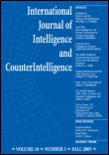
International Journal of Intelligence and Counterintelligence
Scope & Guideline
Connecting theory and practice in a volatile global context.
Introduction
Aims and Scopes
- Intelligence Operations and Ethics:
The journal critically examines the ethical considerations surrounding intelligence practices, including human intelligence (HUMINT) and the moral implications of surveillance and targeted operations. - Historical Analysis of Intelligence Practices:
It offers insights into the historical context of intelligence operations, including case studies from the Cold War and post-Cold War periods, emphasizing the evolution of intelligence methodologies. - Interdisciplinary Approaches to Intelligence Studies:
The journal embraces interdisciplinary perspectives, integrating insights from political science, sociology, psychology, and technology to understand the complexities of intelligence work. - National Security and Intelligence Policy:
The discussions often revolve around the relationship between intelligence activities and national security policy, including oversight, accountability, and the implications for democratic governance. - Emerging Technologies and Intelligence:
With a growing focus on the impact of technology on intelligence operations, the journal explores topics such as cyber intelligence, artificial intelligence, and data-driven security approaches.
Trending and Emerging
- Ethics and Accountability in Intelligence:
There is a marked increase in discussions about the ethical responsibilities of intelligence officers and the need for accountability in intelligence practices, especially in the context of national security. - Cyber Intelligence and Digital Warfare:
The journal is increasingly focusing on the implications of cyber threats and the role of intelligence in combating digital warfare, reflecting the contemporary security landscape. - Intelligence and Privacy Concerns:
Emerging themes include the balance between national security and individual privacy, particularly in discussions about open-source intelligence (OSINT) and the use of commercially available information. - Diversity and Inclusion in Intelligence Communities:
There is a growing emphasis on exploring diversity within intelligence organizations, including the impact of demographic diversity on intelligence efficacy and decision-making. - The Role of Emerging Technologies in Intelligence:
The impact of artificial intelligence and machine learning on intelligence operations is a rising theme, highlighting the need to adapt intelligence practices to technological advancements.
Declining or Waning
- Cold War Espionage Narratives:
While historical accounts of Cold War espionage were once prevalent, there seems to be a shift away from these narratives in favor of contemporary issues, potentially due to a focus on current geopolitical dynamics. - Traditional HUMINT Techniques:
Discussions surrounding traditional human intelligence techniques are becoming less frequent, possibly overshadowed by the rise of technology-driven intelligence methods. - Soviet-Era Intelligence Studies:
The specific focus on Soviet-era intelligence operations appears to be waning, as newer topics related to current threats and challenges take precedence. - Historical Intelligence Ethics:
While ethics remain a core theme, the historical perspectives on intelligence ethics are less frequently addressed, indicating a trend towards contemporary ethical dilemmas. - Focus on Domestic Intelligence:
The exploration of domestic intelligence operations, particularly in non-democratic regimes, has seen a decline compared to the robust discussions around international intelligence dynamics.
Similar Journals
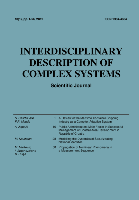
Interdisciplinary Description of Complex Systems
Navigating the Complexity of Our Interdisciplinary WorldInterdisciplinary Description of Complex Systems is a prominent academic journal dedicated to the exploration and understanding of complex systems, published by the CROATIAN INTERDISCIPLINARY SOC. Since its inception in 2003, this journal has embraced an Open Access model, facilitating the widespread dissemination of research within a diverse range of disciplines intersecting with complex systems theory. The journal spans fields including mathematics, engineering, natural and social sciences, making it a vital resource for researchers, professionals, and students eager to explore interconnected systems in a global context. With its rigorous peer-review process and commitment to innovation, Interdisciplinary Description of Complex Systems stands as a significant contributor to advancing knowledge, encouraging interdisciplinary collaboration, and fostering new insights into complex phenomena. The journal’s dedication to open access ensures that valuable research is freely available, promoting global participation in the scholarly dialogue.
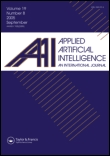
APPLIED ARTIFICIAL INTELLIGENCE
Connecting Scholars and Industry in AI AdvancementAPPLIED ARTIFICIAL INTELLIGENCE, an esteemed journal published by Taylor & Francis Inc, serves as a vital platform for sharing groundbreaking research and advancements in the field of artificial intelligence. With an E-ISSN of 1087-6545, this Open Access journal since 2022, offers scholars the opportunity to disseminate their findings widely, increasing visibility and accessibility in the academic community. With a history dating back to 1987, the journal features a compelling Q3 category ranking in Artificial Intelligence and holds respectable placement in Scopus rankings, emphasizing its relevance and contribution to both Electrical and Electronic Engineering and Computer Science. Targeted at researchers, industry professionals, and students, APPLIED ARTIFICIAL INTELLIGENCE is dedicated to promoting innovation and fostering dialogue on the practical applications of AI technologies, making it an indispensable resource for anyone striving to advance their knowledge and expertise in this rapidly evolving domain.
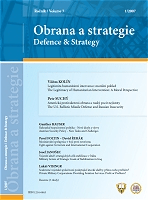
Obrana a Strategie-Defence & Strategy
Connecting Emerging Voices in Military Strategy and Safety Research.Obrana a Strategie-Defence & Strategy is a prominent academic journal dedicated to the critical fields of Political Science and International Relations, as well as Safety Research. Published by the esteemed UNIV DEFENCE, CENTER SECURITY & MILITARY STRATEGIC STUDIES in the Czech Republic, this open access journal has been offering unrestricted visibility to its research outputs since 2001, fostering a culture of knowledge sharing among scholars and practitioners. While currently positioned in the Q4 quartile in its categories and maintaining a Scopus rank that places it in the lower percentiles, the journal serves as a vital platform for emerging discussions on military strategy, defense mechanisms, and global security issues. With an aim to bridge the gap between theoretical frameworks and practical applications, Obrana a Strategie-Defence & Strategy contributes to shaping insights that are essential for informed decision-making in contemporary defense and strategic studies. Whether you are a researcher looking to publish your findings or a student seeking to engage with current academic debates, this journal represents an invaluable resource in the ongoing exploration of security dynamics.

Perspectives on Science and Christian Faith
Exploring the Harmony Between Faith and SciencePerspectives on Science and Christian Faith is a distinguished journal published by the American Scientific Affiliation, focusing on the intersection of science and theology. With an ISSN of 0892-2675, this journal aims to provide a platform for scholarly discourse on how Christian faith interacts with scientific inquiry, addressing philosophical, ethical, and practical implications of this relationship. As an essential resource for researchers, professionals, and students in both scientific and theological fields, it encourages innovative perspectives and critical analysis to foster a deeper understanding of how faith and science can coexist and enrich one another. Although it operates under a subscription model, the journal remains deeply committed to promoting an engaging dialogue among its readership, contributing to the ongoing conversation about faith in the context of contemporary scientific developments. With its focused mission, Perspectives on Science and Christian Faith is instrumental in exploring vital issues that resonate with the spiritual and intellectual pursuits of its community.
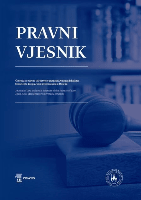
Pravni Vjesnik
Fostering Discourse in Law and Society.Pravni Vjesnik is a peer-reviewed academic journal published by the Pravni Fakultet Sveučilišta Josipa Jurja Strossmayera & Osijek, primarily focusing on the field of law within the social sciences. Since transitioning to an Open Access model in 2016, the journal has broadened its accessibility, allowing researchers, professionals, and students to engage with diverse legal scholarship without subscription barriers. With an ISSN of 0352-5317 and an E-ISSN of 1849-0840, Pravni Vjesnik plays a crucial role in disseminating knowledge and fostering discourse in the legal community, particularly within the context of the Croatian legal system and broader European legal frameworks. Although it holds a rank of #760 out of 1025 in the Scopus database, placing it in the 25th percentile of law journals, its commitment to quality and relevance ensures its importance as a resource for rigorous academic inquiry. The journal's scope is anticipated to expand from 2019 to 2024, promoting ongoing research in contemporary legal issues. This dedication to publishing comprehensive and impactful studies makes Pravni Vjesnik an essential platform for those involved in the legal field.
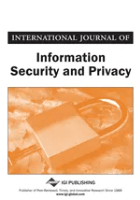
International Journal of Information Security and Privacy
Illuminating the Path to Enhanced Data ProtectionInternational Journal of Information Security and Privacy is a pivotal resource for scholars and practitioners in the rapidly evolving field of information systems. Published by IGI Global, this esteemed journal, identifiable by its ISSN 1930-1650 (E-ISSN 1930-1669), explores critical aspects of information security and privacy, focusing on innovative approaches, technologies, and best practices that safeguard data in an increasingly digital world. Since its inception in 2007, it has contributed significantly to academic discourse, addressing major challenges faced by organizations and individuals alike. Although it currently ranks in the Q4 quartile and occupies the 249th position out of 394 in the Scopus computer science category, the journal has a commendable reach and continues to attract impactful research. As part of its commitment to advancing knowledge, the journal encourages contributions that deliver actionable insights, making it an ideal platform for researchers, professionals, and students interested in the forefront of information security. Engaging with this journal provides access to the latest findings and methodologies while offering a space for the exchange of transformative ideas in the realm of information privacy.
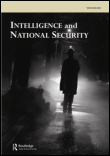
INTELLIGENCE AND NATIONAL SECURITY
Uncovering Insights for a Safer WorldINTELLIGENCE AND NATIONAL SECURITY is a leading academic journal published by Routledge Journals, Taylor & Francis Ltd, providing critical insights into the interplay between intelligence practices and national security concerns. With its origins dating back to 1986, this journal has established itself as a vital resource for researchers and practitioners alike, offering a platform for the dissemination of rigorous research across History (Q1) and Political Science and International Relations (Q2). While the journal does not operate under an Open Access model, its articles are accessible through institutional subscriptions, ensuring that important findings reach a wide audience. The journal ranks significantly on Scopus, holding the 93rd percentile in History and the 61st percentile in Political Science, underscoring its relevance and impact in scholarly discourse. Whether you are a researcher looking to publish your findings or a student seeking in-depth analysis in the field, INTELLIGENCE AND NATIONAL SECURITY remains an indispensable resource for advancing understanding in the complexities of global security issues.
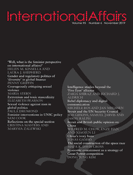
INTERNATIONAL AFFAIRS
Navigating the Complexities of Global IssuesINTERNATIONAL AFFAIRS, published by OXFORD UNIVERSITY PRESS, stands as a premier journal in the fields of political science and international relations, boasting an impressive Impact Factor and a reputation for rigorous scholarship. Established in the United Kingdom, the journal's ISSN is 0020-5850 and its E-ISSN is 1468-2346. From its inception to the present, it has played a crucial role in analyzing and interpreting global issues that shape our world, with a notable mention of its Q1 quartile ranking in both Political Science and Sociology according to 2023 metrics. Researchers and practitioners alike benefit from its high-quality, peer-reviewed articles, which consistently rank it in the top percentile of its category, underscoring its significance in contemporary discourse. As the journal continues to evolve, it remains a vital resource for those looking to deepen their understanding of international affairs and sociopolitical dynamics.

Przeglad Sejmowy
Navigating the Complexities of Governance and LawPrzeglad Sejmowy, with its ISSN 1230-5502 and published by WYDAWNICTWO SEJMOWE, serves as a critical platform for discourse in the realm of political science and legislative studies. Based in Warsaw, Poland, this journal explores the intricacies of parliamentary functioning, governance, and legislative developments, making it an essential resource for researchers, professionals, and students interested in the dynamics of national legislation and its implications. Although Open Access options are not currently available, the journal provides in-depth analyses and scholarly articles that are pivotal for understanding the legislative process within the Polish context. With a focus on fostering informed debate and enriching academic dialogue, Przeglad Sejmowy stands out as a valuable asset for anyone looking to deepen their knowledge in the field of political studies. Whether you are a seasoned researcher or a novice looking to explore legislative intricacies, this journal is designed to engage and inform.
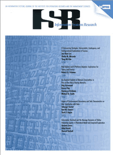
INFORMATION SYSTEMS RESEARCH
Cultivating excellence in information systems research since 1990.INFORMATION SYSTEMS RESEARCH, published by INFORMS, stands as a pivotal academic journal in the field of information systems and management. With a robust impact factor and consistently achieving Q1 quartile rankings across multiple categories—including Computer Networks and Communications, Information Systems, and Library and Information Sciences—it has established itself as a leading forum for innovative research and practical insights. The journal has been converging scholarly work since 1990, offering a rich repository for researchers, professionals, and students interested in the intersection of decision sciences and technology. While it operates under standard access options, its significant contributions to the field ensure that it remains a critical resource for advancing knowledge and fostering professional growth. Situated in the United States, INFORMATION SYSTEMS RESEARCH not only comprehensively addresses contemporary challenges in the domain but also influences best practices and strategic decision-making across various industries.